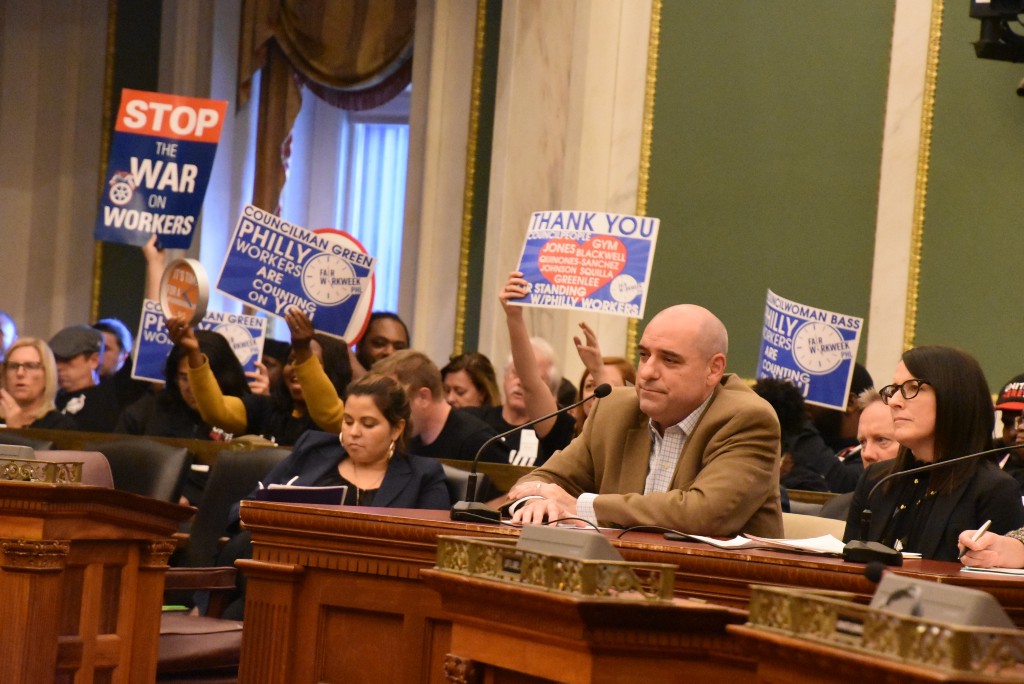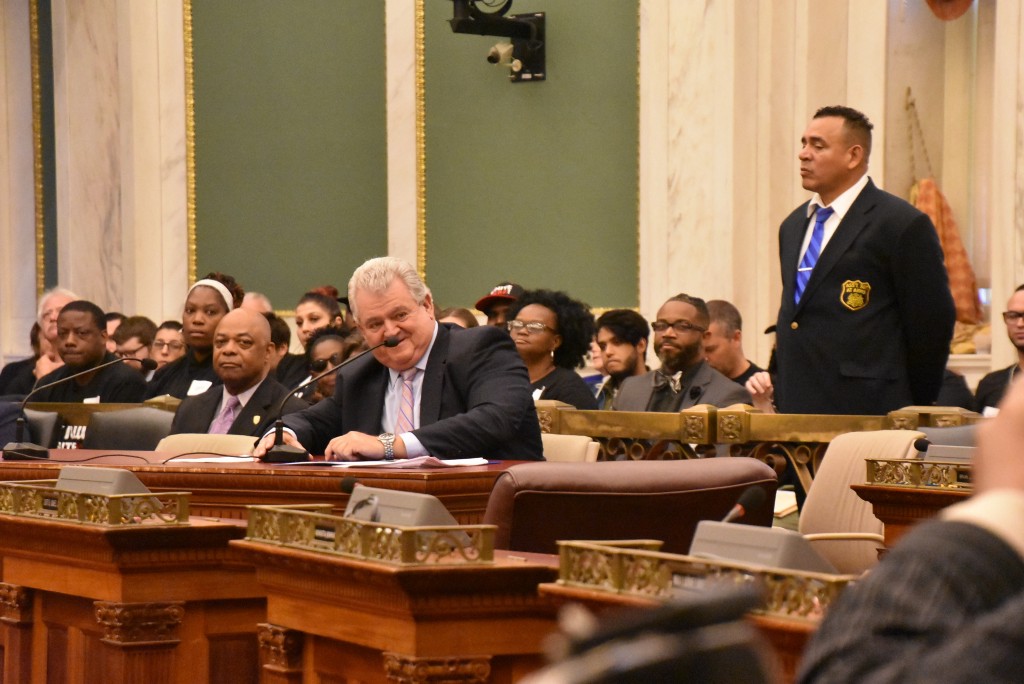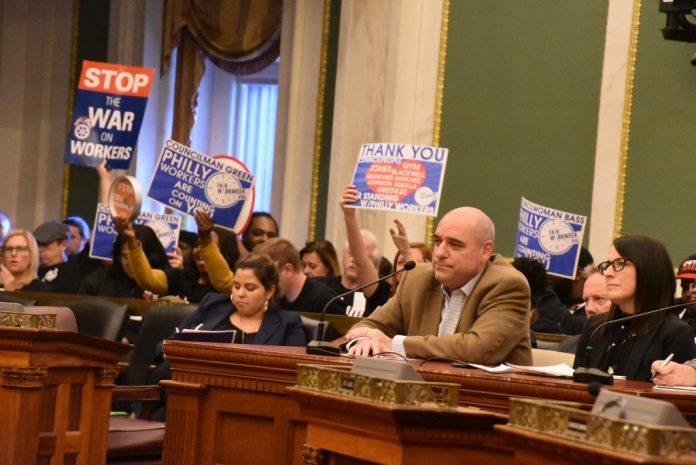City Council advanced a bill last week that would provide some workers with advanced notice of their schedules.

City Council is moving toward a vote on a bill that would give certain low-wage service industry workers advanced notice of their schedules as well as the opportunity to pick up additional hours.
The legislation, dubbed the “fair workweek” bill, was passed by a City Council committee after nearly three hours of testimony from workers, union leaders, business representatives and others and an additional hour of apparent dealmaking and changes.
Championed by Councilwoman At-Large Helen Gym, the bill would require retail, restaurant and hotel chains to give their hourly employees notice of their schedules 10 days before the start of the workweek beginning in 2020. In 2021, the notice period will be increased to 14 days.
The regulations would apply only to people who work for companies in the retail, hospitality or food services industries that have at least 250 employees and 30 locations worldwide. Gym also said the legislation covers workers only if they make under $24,000.
“These are are lowest-wage workers,” Gym said. “Those workers deserve it. They’re asking for it.”
Employers who change the weekly schedule after it is posted would be required to give workers “predictability pay” to compensate for the changes.
In addition, companies covered under the law would be required to offer additional shifts to current employees before hiring new people.
Companies that violate the regulations could face fines, penalties and legal action.
An estimated 130,000 workers in the city would be protected under the legislation, according to information provided by Gym.
Proponents of the bill, many of whom packed City Hall for the Oct. 30 hearing, touted the effect the rules could have on creating stable schedules and improved conditions for the working poor.
“This bill provides truly basic protections that all workers should have,” said U.S. Rep. Bob Brady, who testified at the hearing. “This is common-sense legislation. It’s our responsibility as lawmakers to guarantee protection that many of us take for granted.”

Representatives from various business associations spoke in opposition to Gym’s bill, saying it would hamper flexibility and put an additional administrative burden on businesses.
“Owners and store managers are in the best position to understand and respond to the needs of their employees and the community,” said John Holub, executive director of the Pennsylvania Retailers’ Association. “Enacting this proposed bill will disadvantage Philadelphia store owners and the jobs that they provide our residents.”
Council’s Law and Government Committee voted 6–2 to move the bill with a favorable recommendation, but not before more than 60 amendments were made to the original legislation. Tenth District Councilman Brian O’Neill and Councilman At-Large David Oh, both Republicans, voted against the bill.
It will now head to the full 17-member Council, and a final vote could happen as early as Nov. 29.
O’Neill said he would like to see hotels excluded from the bill. Other cities that have passed similar bills have not included the hospitality industry, he said.
“I hope that it changes because it’s a very serious weakness in the bill,” O’Neill said.
“I don’t think Philadelphia is in a position to have an anti-business perception around the country,” he added. “I think this goes way too far.”
O’Neill said he would consider supporting the bill if there were additional amendments to address issues presented by the business community. Even though the bill made it out of committee, there’s still time for changes.
“I don’t think this bill is finished yet,” said Sixth District Councilman Bobby Henon, a co-sponsor of the bill, after the committee vote. “I still think there’s some other members who may have some input on what it looks like finally, but I think it’s a step in the right direction.”
Dan McElhatton, government affairs chair for the Greater Northeast Philadelphia Chamber of Commerce,, said the business group is backing a coalition led by the Philadelphia Chamber.
“The issue is one that doesn’t apply to a great majority of our membership” because of the conditions regarding number of employees and locations, said McElhatton, a former councilman.
A representative from the Greater Philadelphia Chamber of Commerce told the Times that the organization is reviewing the amendments with its members.
The citywide Chamber submitted testimony against the bill for the Oct. 30 hearing, calling the legislation an “inflexibility mandate.” In addition, the Chamber said the bill would cover only about 37,000 workers.
“Fair workweek” legislation has already been enacted in several other cities, including New York and Seattle.
First Deputy Commerce Director Sylvie Gallier Howard said city officials have studied how the bill has been applied in other cities. In some cases, it has led to increased tension between employers and workers and caused some companies to hire fewer people, she said.
Philadelphia also has a higher poverty rate than other cities that have introduced “fair workweek” measures, according to Gallier Howard.
“It’s different in every city,” she said. “We really have to make sure we have a bill that’s good for Philly.”
Representatives from Mayor Jim Kenney’s administration seemed tentatively in favor of Gym’s bill. Deputy Mayor for Labor Rich Lazer said the administration supports the aim of the legislation but also wants to strike the right balance.
At Thursday’s Council meeting, Gym said the bill is the “next-best thing” to raising the minimum wage — which the city is prohibited from doing by state law.
“I am committed to getting this legislation right,” she said. ••
Jack Tomczuk can be reached at [email protected]






